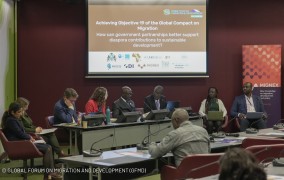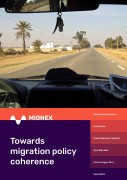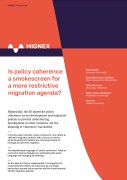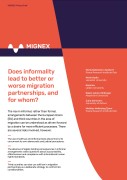MIGNEX Insight
The research-policy dialogue: engaging in conversation rather than talking past each other
What constitutes a constructive, ethical and effective research-policy dialogue? A Migration Governance Cluster meeting at the European Commission (EC) provided an opportunity to discuss with policy officials and members of other EC funded projects and to reflect on ways to bring researchers and policy makers more in conversation with one another.
Researchers and policy officials are often perceived to be on opposite sides of the migration agenda, driven by conflicting roles and incentives. A recent Migration Governance Cluster meeting attended by Jørgen Carling and Jessica Hagen-Zanker illustrated ways in which this perceived divide can be overcome through dialogue engagement between actors in the research and policy fields. One participant at the meeting recalled a recent event where the policy side urged researchers to make their output more policy-relevant. This call was met with objections by researchers that research should not be conducted at the service of policy. However, as the participant noted, it is fully possible to engage with policy without being subservient. Talking past each other in this way creates an impasse in the research-policy dialogue.
This is all about research ethics
In MIGNEX we consider the project’s relationship with EU migration policy as an aspect of research ethics. We don’t want to be — or be perceived as — a resource for devising policy that is not only contested but potentially goes against the interests of our research participants. At the same time, we have an ethical obligation vis-à-vis the European Union as a funder. The research is financed to help address societal challenges, and we have taken on that task in designing the research.
A phrase that we have used to describe our role is that ‘the research is conducted independently with an aim to examine, challenge and inform European policy’. In other words, we have an obligation to make our work interesting and relevant to European policy actors, but we can also achieve this by voicing objections to current policy measures or objectives.
It’s not policy officials vs. researchers
Our conversations in the European Commission confirmed a more general picture: the cleavages within policy organizations are as important as the ones between research and policy. That is, officials who are responsible for liaising with researchers must compete for attention and resources within their own organizations in order to sustain investment in research and to disseminate findings from ‘their’ research. Officials told us that they do understand and value research, but that they are not the ones who need convincing.
Policy officials’ success depends on researchers’ ability to communicate effectively. Much of what was said resonated with our own communications pyramid, which will become ever more important as MIGNEX starts producing results. The idea is that a pithy, memorable insight relays the essence of a brief-length, accessibly written publication, which in turn is underpinned by a full-length technical publication. The quality at all three layers contributes to reaching the audience and making an impact.
Personal relationships play an ambivalent role in the research–policy dialogue with the European Commission. On the one hand, trust-based relationships that grow over time are invaluable — a model that we are also employing in our End-User-Board. The more we engage in continuous dialogue, the better we understand each other and the more opportunities researchers have to bring in research findings at key moments. On the other hand, relationship management involves a significant time investment on both sides, and the relatively high turnover of staff in the European Commission can make this challenging.
Where to engage
The discussions also brought out the limitations of how MIGNEX engages with policy. Our objective is to inform the big picture of European policy approaches to migration management and the migration–development nexus. And while we do so by learning from 25 diverse local contexts, we are not contributing directly to policy-making in those settings. This is in contrast to our sister project AGRUMIG, which also works in areas of origin but with a much greater emphasis on local stakeholder engagements. By setting clear priorities, which in the case of MIGNEX is comparative research, each project is better positioned to meet its objectives.
Cite this publication
Carling, Jørgen and Hagen-Zanker, Jessica. (2020) The research-policy dialogue: engaging in conversation rather than talking past each other. MIGNEX Insights. Oslo: Peace Research Institute Oslo. Available at: https://www.mignex.org/publications/research-policy-dialogue-engaging-conversation-rather-talking-past-each-other




